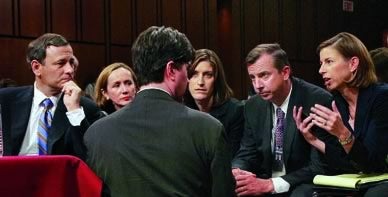Rachel Brand ’98 has occupied a series of high-profile government jobs in a career that has taken her from the White House to the Supreme Court and the Justice Department.
But she remained silent during her most prominent moment in the spotlight as the assistant attorney general shepherding President George W. Bush’s two Supreme Court nominees through the Senate. Brand sat directly behind Chief Justice John G. Roberts Jr. ’79 and Samuel A. Alito throughout their confirmation hearings, in full view of the television cameras.
These days, Brand is leading the U.S. Chamber of Commerce’s campaign to roll back government regulations while also serving as one of the charter members of a new Privacy and Civil Liberties Oversight Board.
For Brand, the oversight board is a way to stay involved in government service, which she chose as her career path even before enrolling at Harvard Law School.
After a clerkship with Professor Charles Fried, when he served as a justice on the Massachusetts Supreme Judicial Court, Brand worked briefly for the presidential exploratory committee of Elizabeth Dole ’65 before joining a small Washington, D.C., law firm headed by prominent appellate litigators Charles Cooper and Michael Carvin.
She found herself in Tallahassee, Fla., during the disputed 2000 Bush v. Gore presidential recount and then landed in the Office of the White House Counsel, where her responsibilities shifted after the 9/11 terrorist attacks to include helping draft the executive order to create the Office of Homeland Security, the precursor to the Department of Homeland Security.
“It was an amazing change in mindset from the day before 9/11 to after,” said Brand, who remembers spending an all-nighter at the White House after evacuating the building on the day of the attack.
After clerking for Justice Anthony Kennedy ’61, Brand moved to the Justice Department’s Office of Legal Policy, which in 2005 she was confirmed by the Senate to lead. It was in that job that she led the “murder boards,” the mock sessions where Roberts and Alito prepared for their hearings, and fulfilled the Senate Judiciary Committee’s voluminous document requests.
“She has a very, very savvy political and practical sense.”
Charles Fried
“Nothing gets by her,” said Fried. “In addition to being a good lawyer, she has a very, very savvy political and practical sense.”
Brand left the Justice Department in 2007, when she was eight months pregnant, and started a three-year stint at WilmerHale in 2008. (She met her husband, Jonathan Cohn ’97, when they both attended a Federalist Society student conference at Stanford University.)
Brand shifted to the Chamber of Commerce’s litigation arm in 2011, where she’s responsible for challenging Obama administration regulations issued by agencies such as the Securities and Exchange Commission and the Labor Department. Late this spring—along with Kate Todd ’99—Brand was promoted to lead the chamber’s litigation center.
The chamber files amicus briefs in about 100 cases a year and also engages in its own litigation, including a record-high five cases last year, Brand said.
“Some of our cases are very high-profile; others are not as high-profile, but they’re important to members and have an economic impact,” Brand said. “There’s a perception that we file a new lawsuit a week. That’s not true. We’re judicious, but we’re not afraid to litigate when it’s necessary.”
Brand’s most high-profile victory at the chamber came in January, when the U.S. Court of Appeals for the D.C. Circuit invalidated several recess appointments to the National Labor Relations Board, a case the Obama administration has asked the Supreme Court to review.
In 2012, Brand, along with Elisebeth Cook ’00, became a member of the board within the executive branch tasked with monitoring how government counterterrorism activities impact civil liberties and privacy.
“It’s nice to have a hand in public policy matters again,” Brand said. “I won’t say it’s not a challenge to balance two jobs and two children—I’m pretty busy.”
